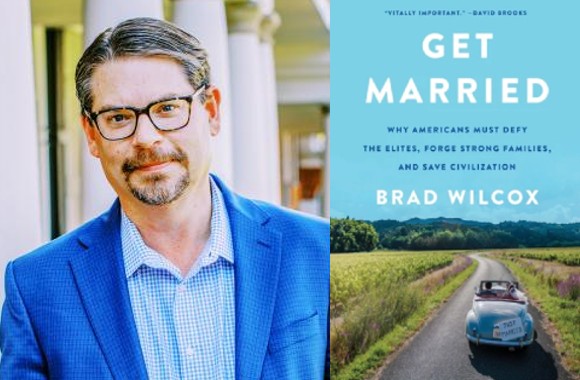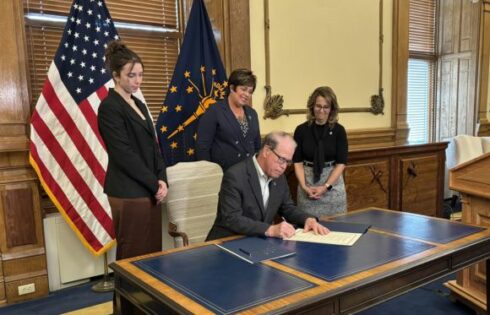
‘Nothing predicts happiness … like a good marriage does,’ professor says
A well-known conservative professor of sociology at the University of Virginia recently made a case for why people should work toward starting and maintaining strong marriages.
“Married Americans are markedly more likely to be financially secure and almost twice as likely to be very happy with their lives compared to their single peers in the U.S,” Professor W. Brad Wilcox said during the July 23 webinar.
According to his research, Wilcox said that marriage is a more conclusive factor for happiness than education, money, career, sex, or church attendance.
He said his findings stand in stark contrast to the single life celebrated on social media and pop culture, which portrays single men and women as happier than married couples.
“There is just no question in the data that that’s false,” Wilcox said.
Wilcox made the comments during his talk titled “Minority Opinion: Save This Institution.”
It was hosted by the Jefferson Council, a group of University of Virginia alumni and other stakeholders that describes itself as dedicated to preserving the school’s history and the free exchange of competing ideas and intellectual diversity.
 “Professor Brad Wilcox is one of those few voices in the world of higher education today clearly illustrating the need for a return to marriage and other community-strengthening institutions with solid data and research on outcomes,” said the council’s Executive Director Sam Richardson in an email to The College Fix.
“Professor Brad Wilcox is one of those few voices in the world of higher education today clearly illustrating the need for a return to marriage and other community-strengthening institutions with solid data and research on outcomes,” said the council’s Executive Director Sam Richardson in an email to The College Fix.
“His message of encouragement for today’s students and recent graduates to create that life they know instinctively to be the most personally healthy and socially-positive needs to be heard by everyone.”
Wilcox’s talk drew data and information from his new book “Get Married: Why Americans Must Defy the Elites, Forge Strong Families, and Save Civilization,” published in February. In it, he culled statistics from YouGov surveys, general social surveys on happiness, and census data on financial security, among other sources.
Forty percent of married moms said they were “very happy” compared to 22 percent of women who were single and childless, he said. Furthermore, 13 percent of married women said they were “not very happy” compared to 25 percent of single women.
Having a spouse “gives your life a sense of meaning … direction … purpose and stability,” and someone that “helps you navigate both the highs and the lows,” he said.
It also makes sense financially: in a Minnesota study, male twins who were married earned about 26 percent more than their unmarried twin, he said.
During the webinar, Wilcox talked about four groups of people that are what he refers to as “masters of marriage”: conservatives, Christians, Asian Americans, and the college educated.
These groups, Wilcox said, are “masters of marriage” because the men generally have stable jobs, and the married couple are committed to each other and recognize marriage as a necessary institution. These four groups also generally have strong religious beliefs and friends with similar values surrounding marriage and family.
“When it comes to financial security in your fifties … we see that married men and married women [have] about ten times the assets as their unmarried peers,” Wilcox said.
Wilcox responded to The College Fix’s query about the levels of happiness of married people versus those who just cohabitate during the webinar by saying that those who are married still have higher levels of happiness due to stability.
“Kids who are born to cohabiting parents are about twice as likely to see their parents break up compared to kids who are born to married parents,” Wilcox said, adding children from families with married parents are more likely to go to college and less likely to be imprisoned.
“We have to recognize from a public policy perspective how much education at all levels matters for … shaping the hearts and minds of our kids and of our young adults,” he said.
Yet elites like celebrities and CEOs push liberal ideas — but live more conservative ideals privately themselves, Wilcox said.
Wilcox gave an example of one of the leaders of Netflix, who has had a stable marriage with kids for over 30 years after marital problems early in their marriage that he and his wife worked through instead of quitting. But family ideals aren’t at the forefront of the shows that Netflix produces, he added.
“They’re not typically using that authority to educate the broader public of the ways in which marriage matters to them personally,” he said.
MORE: Universities should encourage marriage and family: Notre Dame researcher
IMAGE: Monkey Business Images / Shutterstock
Like The College Fix on Facebook / Follow us on Twitter






Please join the conversation about our stories on Facebook, Twitter, Instagram, Reddit, MeWe, Rumble, Gab, Minds and Gettr.